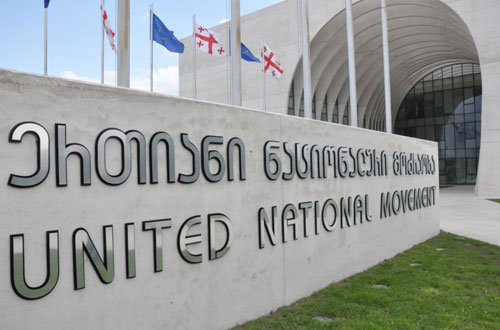
UNM Headquarters. Photo: UNM
MP Sergo Ratiani, United National Movement’s (UNM) executive secretary, stated that the party congress scheduled for January 20 will not be legitimate and its decisions will not carry legal consequences.
Ratiani’s statement is the latest episode in the ongoing internal party dispute in the United National Movement, the country’s second largest parliamentary party. The sides disagree over the the issue of congress organization; while Mikheil Saakashvili and his sympathizers are in favor of conducting the congress on January 20 and are holding preparatory meetings across the country, the other side, under the leadership of Giga Bokeria and Davit Bakradze, questions its legitimacy and accuse Saakashvili of hijacking the congress organization in circumvention of the political council (UNM’s 60-member governing body).
Ratiani, who stands with Bokeria and Bakradze in the dispute, sent an official letter to UNM’s district and city office heads on January 3, stating that the congress is being organized in violation of party statute. “The political council was to select the special committee for organizing the congress, which has not happened. Therefore, the issue of congress organization has entered into a legal limbo,” Ratiani explained.
“We are aware that, some heads of [UNM’s] district offices are planning to convene conferences for selecting the [congress] delegates. This is to inform you, that the rule for conducting the conferences is not defined by the party statute. Moreover, the political council meeting (referring to the December 27 meeting), which was to set the rules for [these] conferences, failed to convene. Therefore, a conference held illegitimately will not be authorized and will not have a legal force,” Sergo Ratiani added.
“The [party] convention will be held as scheduled, will be as numerous as always and a lot more democratic, than it has ever been,” Zaza Bibilashvili, the political council member and one of the Saakashvili-allies, wrote in his Facebook post in response to Ratiani’s statement.
“Any reference to the illegitimate nature of the congress … especially from those who have not questioned the legitimacy of elections stolen by Ivanishvili, to put it mildly, is inappropriate and raises a lot of questions,” Bibilashvili added.
Ratiani’s statement comes after the contested establishment of the congress organizing committee two weeks ago.
On December 22, Saakashvili-sympathizers formed a six-member committee for organizing the congress (each nominated by five political council members) and launched preparatory meetings with party activists across the country. Bokeria-Bakradze’s group criticized Mikheil Saakashvili of hijacking the congress organization in circumvention of the political council and refused to nominate the rest of the committee members citing the political council’s November 30 decision that “the composition of the organizational committee should be set by the political council.”
Davit Bakradze, who heads the party’s political council, offered to reschedule the party congress on December 24, but the proposal was rejected by Mikheil Saakashvili.
UNM’s political council meeting on December 27, called by Davit Bakradze to settle the differences between the two sides over the disputed party congress, failed to convene due to the absence of Saakashvili-sympathizers. 27 political council member issued a statement saying that the procedures for conducting the congress were already set at the political council’s November 30 meeting and that there was no need for “hasty” assembly of the political council before the January 10 deadline set at the very same meeting. They also criticized their opponents for not cooperating on the organizational matters and not nominating the rest of the committee members to the organizational committee.
On December 28, the six-member organizational committee held its first working session and elected Petre Tsiskarishvili and Nino Kalandadze as the committee head and the committee secretary respectively. Bokeria-Bakradze’s group did not participate in the working session.
Intra-party crisis emerged in the aftermath of October 8 Parliamentary Elections, with Georgia’s former president and the founder of UNM, Mikheil Saakashvili, who at that time was also the governor of Odessa region in Ukraine, questioning the overall legitimacy of elections and calling for boycotting the results and with most political council members and future MPs under the leadership of Davit Bakradze and Giga Bokeria preferring to enter the parliament and the majoritarian runoffs.
Saakashvili lost the debate then and the political council opted against the boycott, except in Zugdidi, where UNM’s candidate and Mikheil Saakashvili’s wife Sandra Roelofs refused to participate in the second round.
Disagreement resurfaced after the majoritarian runoffs over the decision of the political council to elect a new chairperson. Majority of UNM’s lawmakers were in favor of electing a new chairperson, while some backbenchers, linked to Mikheil Saakashvili and commanding strong loyalty of the party’s mobilized grassroots, demanded to leave the post vacant – after losing Georgian citizenship, Saakashvili was deprived of the right to be a chairperson of a political party in Georgia, but the party decided not to elect the new chairperson.
Opinions varied over the scale of the congress as well: while Mikheil Saakashvili and his sympathizers argued for a large-scale congress, Bokeria-Bakradze’s side backed a more modest gathering on December 27 with participation of 2 158 delegates. The political council’s November 3 decision to hold the congress on January 20 with 7 000 delegates, as ex-President Mikheil Saakashvili desired, did not end the dispute.
This post is also available in: ქართული (Georgian) Русский (Russian)
